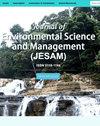Perspective of Environmental Education in Taiwan: Current Status of Implementation
IF 0.3
4区 环境科学与生态学
Q4 ENVIRONMENTAL SCIENCES
引用次数: 0
Abstract
Environmental education is becoming an essential subject as the environment changes rapidly with human activities. To protect the environment, several countries implemented environmental education acts. Taiwan is the sixth country in the world that implemented an act for environmental protection and sustainability. This study reports the 20-year journey of development and the pioneer status of environmental education act into practice. The Ministry of Education of Taiwan and Environmental Protection Agency jointly proposed the environmental education programme in 1992 to create awareness the on environment protection and develop knowledge, attitudes, skills and values necessary for improving the environment. The Environmental Protection Agency is responsible for accrediting qualified environmental education institutions to handle environmental education personnel training, curriculum plan and management, provide professional service of environmental education with rich ecology, etc. During 2011 to 2019, 200 students in 17 cities were issued environmental education certificates and became qualified environmental education personnel. The number of environmental education personnel in Taiwan has increased every year after the implementation of the Environmental Education Law. This study also provides suggestions of integrating environmental education into the school curriculum and the establishment of corporate social responsibility towards environmental education.台湾环境教育之透视:实施现况
随着环境随着人类活动的迅速变化,环境教育正成为一门重要的学科。为了保护环境,一些国家实施了环境教育法。台湾是世界上第六个实施环境保护和可持续发展法案的国家。本研究报告了20年的发展历程和环境教育法在实践中的先驱地位。台湾教育部和环境保护署于1992年共同提出了环境教育方案,以提高对环境保护的认识,培养改善环境所需的知识、态度、技能和价值观。环境保护局负责认证合格的环境教育机构,负责环境教育人员培训、课程规划和管理,提供丰富生态的环境教育专业服务等。2011年至2019年,17个城市的200名学生获得了环境教育证书,成为合格的环境教育人员。《环境教育法》实施后,台湾的环境教育人员逐年增加。本研究还提出了将环境教育纳入学校课程以及建立企业对环境教育的社会责任的建议。
本文章由计算机程序翻译,如有差异,请以英文原文为准。
求助全文
约1分钟内获得全文
求助全文
来源期刊

Journal of Environmental Science and Management
ENVIRONMENTAL SCIENCES-
CiteScore
0.90
自引率
0.00%
发文量
10
审稿时长
2 months
期刊介绍:
The Journal of Environmental Science and Management (JESAM) is an international scientific journal produced semi-annually by the University of the Philippines Los Baños (UPLB).
JESAM gives particular premium to manuscript submissions that employ integrated methods resulting to analyses that provide new insights in environmental science, particularly in the areas of:
environmental planning and management;
protected areas development, planning, and management;
community-based resources management;
environmental chemistry and toxicology;
environmental restoration;
social theory and environment; and
environmental security and management.
 求助内容:
求助内容: 应助结果提醒方式:
应助结果提醒方式:


